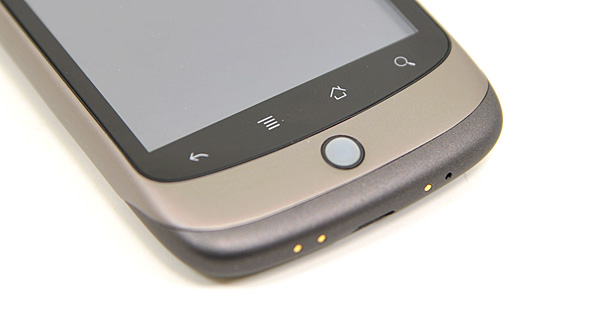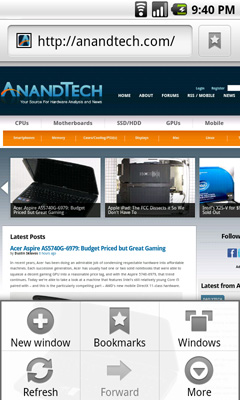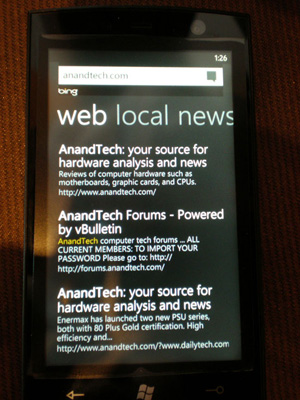Anand's Google Nexus One Review
by Anand Lal Shimpi on April 3, 2010 3:40 AM EST- Posted in
- Smartphones
- Mobile
The Home Bar
The Nexus One has three physical buttons: a power/lock button at the top, volume rocker on the left side and a trackball/button on the face.

The trackball is mostly useless. The Nexus One has a 3.7” multitouch screen for a reason, and it’s way quicker to use the screen than to use the trackpad for scrolling. There are some limited situations where the trackball can be useful, for example while playing games. The iPhone has no useful physical buttons for gaming, the Nexus One’s trackball is better for moving a character around than a virtual d-pad.
Above the trackball there are four touch buttons with fixed functions: back, menu, home and search. By default all provide haptic feedback when activated. In other words, they vibrate a bit when you touch them. It’s a fine feature but it’s nowhere near the feedback you get from physical buttons if that sort of thing matters to you. The buttons also give you the same feedback regardless of whether or not their operation is permitted in the current mode (e.g. hitting the contextual menu button when no such menu exists).
The back button is useful and works as intended, it goes back a screen. The menu button takes some getting used to. The best way I can describe it is like a right click. You get a contextual menu depending on what app you’re running. At the home screen it lets you pop into Android’s settings, add application shortcuts, change wallpaper, view notifications and search. In the email app the contextual menu lets you refresh your inbox, switch to a different folder, change settings, etc...

The contextual menu in Android's Browser app
This is where Android’s more PC-side comes out to play. Apple and Palm for the most part try to keep these sorts of menus away from you. Apps are purposefully not very deep and settings are all controlled through the settings screen, not from within an app. Functionality is driven by the UI. Android takes a more application centric approach. Neither is right or wrong, but both approaches have their pros and cons. I’d argue that Apple/Palm’s approach is better suited for something that’s going to be used as a passive device. Something you’re quickly scanning emails or text messages on. Google’s take is more PC-like. Give the users the options they want, where they want them, even at the risk of UI simplicity.
The Apple method runs the risk of limiting functionality, while Google’s risks turning the UI into a cumbersome mess. Neither is there today, but left unchecked that’s where they’d end up.
Moving on, the home button works as expected, it takes you to your home screen. The search button is particularly interesting because it is one Android feature that Microsoft copied in Windows Phone 7. Hitting the search button brings up an autocomplete enabled Google search box. Hitting go, launches the web browser (very quickly thanks to Mr. Snapdragon) and displays your search results.

What MS is proposing for WP7 are contextual search results that are formatted for the smartphone. Akin to a search app if you will. Search for GeForce GTX 480 and get a normal listing of websites. Search for dentists and get a smartphone formatted list of dentists in your area. Granted MS’ proposal is just that, a proposal, while Android is shipping today. Enabling similar functionality though shouldn’t be hard for Google. I’d love to be able to search, pull results from the web, but have the results presented as more of an app.

Windows Phone 7 Search
The search function will autocomplete things like address book entries, but it won’t automatically search your email for you. While the iPhone’s search function is more focused on searching your device, Android is more interested in helping you search the web. Google has a search engine, Apple doesn’t, the distinction makes sense.










95 Comments
View All Comments
Johnmcl7 - Sunday, April 4, 2010 - link
Very much agreed, I thought far too much time was wasted on Iphone references which given the Iphone generally does everything worse I really couldn't care less about it. Most noticeably multitasking was only given a brief mention despite being being detailed extensively for the Palm Pre reviews.I didn't understand the complaint about the notifications either, to me as a non-Android user the system makes perfect sense - it seems entirely logical to have icons for each notification which when tapped show a list with text on each one.
John
jamawass - Saturday, April 3, 2010 - link
Great review Anand. do you think the speech recognition worked well enough to be a complete subsitute for typed entry? I've been averse to touchscreen only devices (gave iphone to my wife) because I hate typing on them. Also did you try gesture search which has a highly publicized feature not too long ago?I'm currently using a treo pro windows mobile and even with all it's lack of polish it does feel like I am carrying a portable computer with me. I was hoping Windows7 series would enhance this but it appears as if MS is going to take the Apple approach in this regard. Looks like Android has picked up the windows mobile torch and literally flown to the stars with it.
Sidharthmodi - Saturday, April 3, 2010 - link
I liked the Depth in this Product Review. Thanks Anand.has407 - Saturday, April 3, 2010 - link
Appreciate the depth and that it's based on extended use. Using the 3GS for comparison is spot-on (everything is relative). Thanks again.Chloiber - Saturday, April 3, 2010 - link
Can we expect a review on the HTC Desire or Evo 4G?I know the specs are really quite the same (especially on the Desire) but HTC Sense UI gives the whole thing really a different touch and, according to first reviews, a much better usability.
Anand Lal Shimpi - Saturday, April 3, 2010 - link
We've been trying to get in touch with HTC to get review samples of both of those products. So far we haven't received any response but we won't stop trying :) Worst case, we'll just buy an EVO 4G when it comes out.Feel free to write HTC to provide some encouragement if you'd like :)
Take care,
Anand
Chloiber - Sunday, April 4, 2010 - link
Well, I'm waiting for my desire too :PEvo 4G will probably take even longer....to test Sense UI one can use the HTC Legend, Desire or Evo 4G - shouldn't make any real difference.
Anyway, I'm looking forward to it :)
relativityboy - Saturday, April 3, 2010 - link
If you already have an Android powered phone you can find the Sense UI online, and run it with the appropriate Rom and tools. I just saw it running on a G1 today. It was pretty fast. :)relativityboy - Saturday, April 3, 2010 - link
A very lengthy and thorough review of the bits, but I didn't come away with a solid understanding of how the device fits together as a user experience...the review feels, disjointed.The keyboard is narrow, how does that fit with the voice transcription?
Sometimes scrolling in the 'app drawer' is slow, but what else was going on in the background? Were you pulling data, listening to music, what else was going on in the phone? The device/os is a true multi-threaded environment for applications. I didn't notice any emphasis there (a major win over iPhone).
Did you try doing any benchmarking? Use 'Task Killer' or 'Setcpu'?
Android is OPEN, unlike apple's mobile products.
You can install apps that aren't in the app store.
Memory is super-upgradeable (when was the last time a 4Gb or 8Gb iPhone could be upgraded to 32Gb for the price of a micro-sd chip?)
The comment "It's Mac vs PC all over again" I think is totally missing representing what's going on here. Yet you hit the nail on the head later when you said Apple sees it as a device that's peripheral to laptops/pcs while Google is aiming for what it could be. Apple had a great idea, the iPhone. Google had a great idea a mobile environment/platform to allow lots of people to have great ideas. Google wants to let the world do the creating. The Nexus One as a device is a punctuation mark in a much larger story that includes the G1, Devour, HTC Evo, Droid, and others. Software development kits are available for-free for just about every platform you can shake a stick ate. Google is harnessing the creative powers of everyone who wants to get in on the game... The iPhone is just, well, Apple's 'one thing'.
A very respected developer friend of mine once said, "In a contest between your software/idea and the real world, the real world always wins." Google knows this. Apple doesn't.
I'm definitely an Android person, both by UI preference and ideology, but I don't feel like you've really tried, or given yourself enough time to 'get' what this platform is about.
jasperjones - Saturday, April 3, 2010 - link
Agree that Android's openness is of huge importance. On an iPhone, you can't even install an app that features a woman in bikini, Apple won't allow it. In this context, I always have to think of Tim Bray's statement that"The iPhone vision of the mobile internet’s future omits controversy, sex, and freedom, but includes strict limits on who can know what and who can say what. It’s a sterile Disneyfied walled garden surrounded by sharp-toothed lawyers."